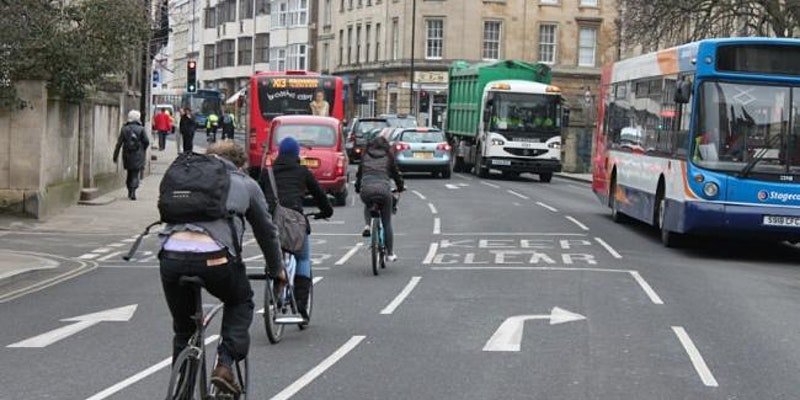Will the proposed traffic filters be good for cyclists?
By Alison Hill and Robin Tucker
Alison is Chair of Cyclox and Robin is Chair of Oxfordshire Cycling Network
Traffic blights our beautiful city of Oxford. And it’s getting worse, with traffic rising year by year (only interrupted by Covid). Doing nothing is not an option, that just means more traffic, more congestion, more pollution, and more climate and health problems for future generations.
That is why we welcome the Central Oxfordshire Travel Plan (COTP), a comprehensive and forward-looking plan to improve transport in Oxford and the surrounding area. COTP is the first Area Strategy of the Local Transport and Connectivity Plan approved unanimously by all parties of Oxfordshire County Council in July.
COTP is a straightforward plan with 22 actions, all of which we support. It shows how Oxford’s traffic can be tamed, and how this can deliver many benefits: improved public spaces, better bus services and access to local services. We like how it tackles important points, such as the importance of junctions to pedestrian and cyclist safety in ‘Vision Zero’.
If these actions are implemented, will it help get more people cycling? We would say yes without a doubt.
However…there’s a devil in the detail.
Traffic filters need to be stronger

When the traffic-filter proposal emerged as the first substantial action of COTP, we hoped that it would transform the major roads in the city by cutting traffic dramatically, and so creating safer streets for cycling. Forty per cent of adults in Oxford cycle regularly, but traffic is biggest factor deterring others. To achieve what national standards consider safe on the painted lanes that abound in Oxford we need to see traffic volumes halve at least.
Traffic filters like those on the High Street and St Aldates, allowing buses and taxis through, but not other motor vehicles, would achieve this. The traffic-filter proposal has six well-placed filters, but with limited operating hours, and a lot of exemptions and permits. These dilute its impact below the ambition of the COTP. They will result in some traffic reduction and may improve bus flow, but the proposals as made will only reduce traffic by 20–35%, which is not enough to make cycling safe and could increase traffic speeds, not giving the boost to cycling that we need.
The changes we want
We strongly believe that there should be fewer exemptions and permits, and the central filters should operate 24/7. So we’ll be supporting the traffic filters but asking for the following changes:
- The city centre operates virtually 24/7, and many collisions involving pedestrians and cyclists occur in the evening, so the central traffic filters should operate 24/7 to protect people using the streets.
- The residential permits, at 100 per year per person are far too generous. A two-person household will be able to cover the school run or driving to work as usual. We will be suggesting that the number of permits should be reduced.
- Vans are essential for many businesses, but the van exemption creates the incentive to buy a van for personal use. This undermines the filters, and risks more large and unwieldy vehicles in the city. Exemptions should only apply to vans in legitimate business use, and even these should have some incentive to reduce usage.
We like the council’s strategy, we like most of their plan. Like them, we know it’s essential. We just don’t want them to dilute its effect at the last stage, so people continue to clog the streets with cars instead of switching to bikes, buses and walking. We need more of the council’s vision to come through into traffic-filter practice.
See our guide to responding to the transport plans.

4 Responses
[…] using road space more efficiently for buses and bikes. Oxford’s current plans – central traffic filters , zero emissions zone and workplace parking levy – were first proposed in 2015 when congestion […]
[…] also supported the traffic filters, though we objected to the proposed exemptions for coaches and for heavy goods vehicles. We […]
[…] implementation of the Central Oxfordshire Travel Plan. Particularly relevant is the introduction of traffic filters, which is significantly delayed by Network Rail’s plans for the Botley Road railway bridge. For […]
[…] place restrictions brings a fairer balance of freedoms. You may have already recognised this as the traffic-filter plan for […]